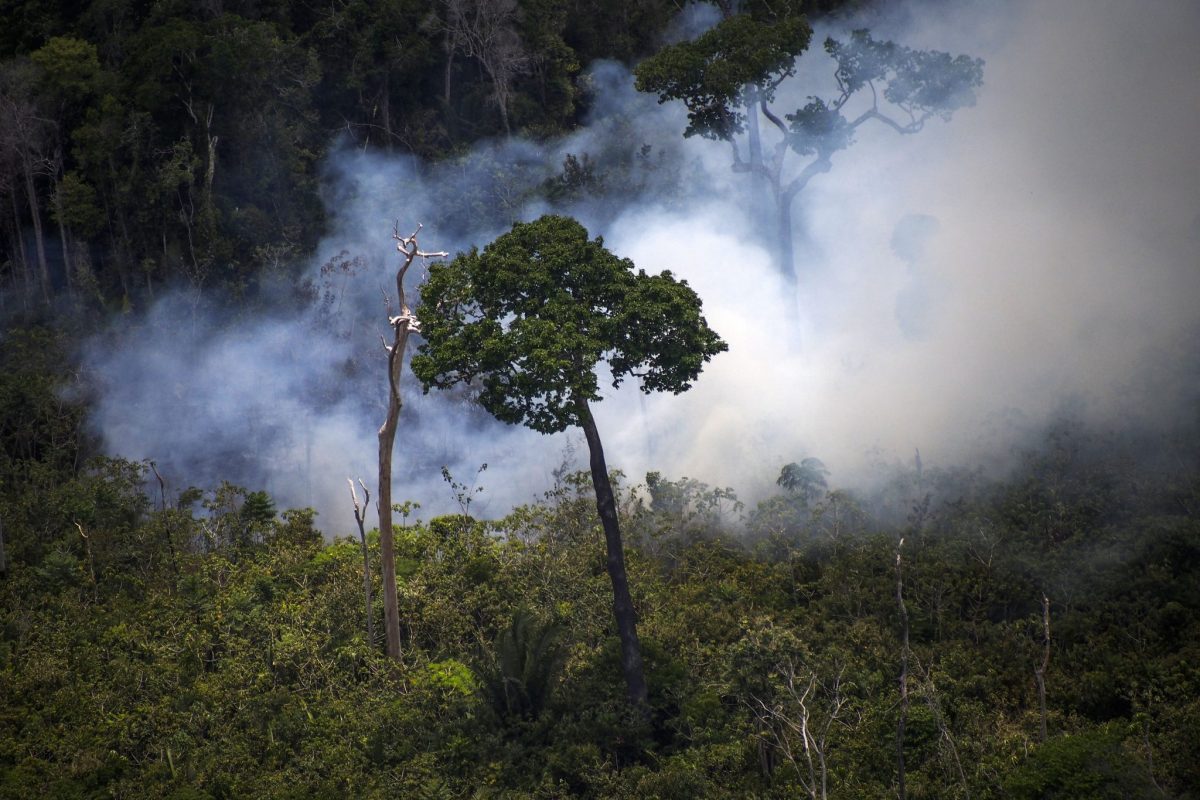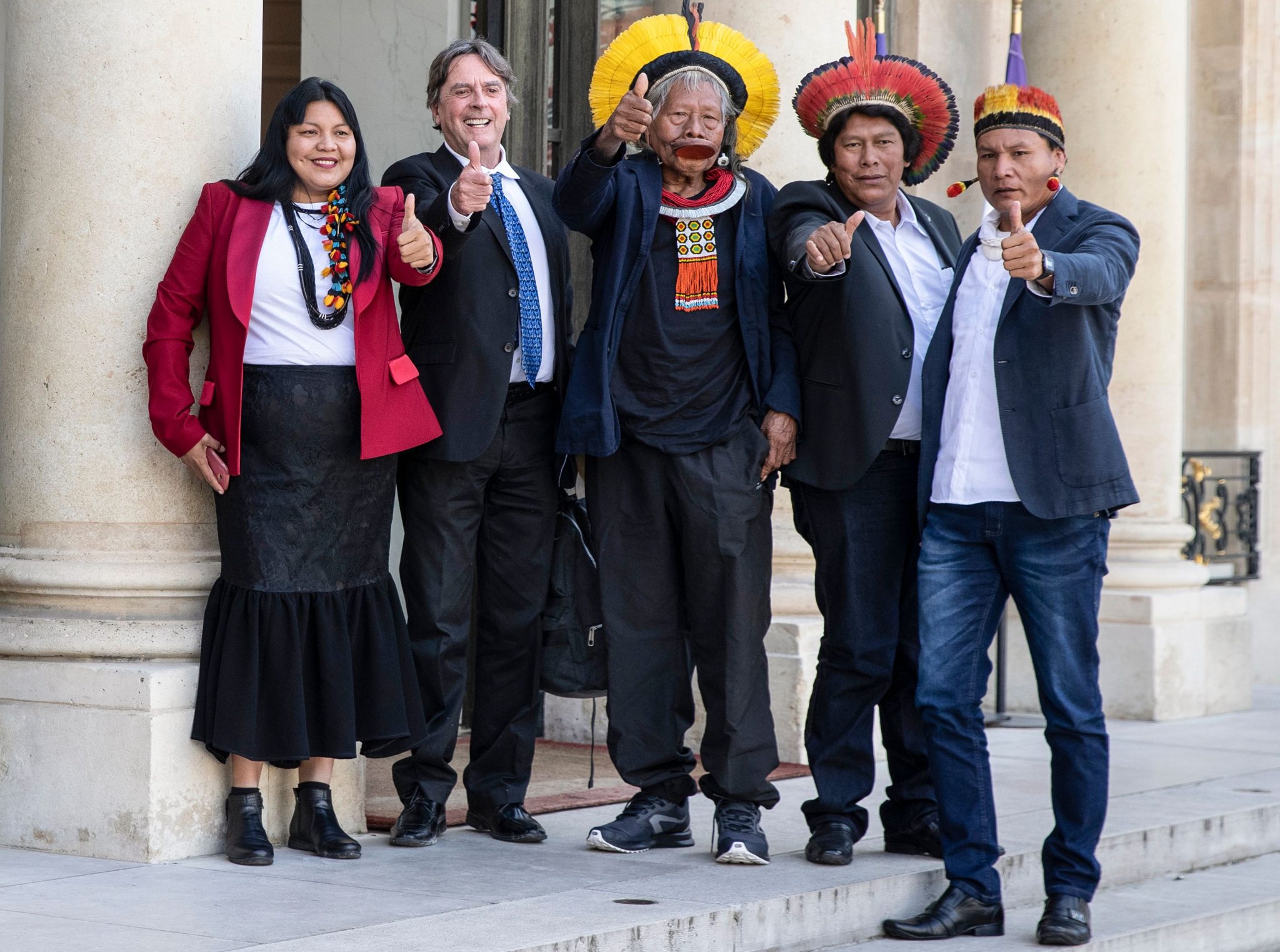

View of a forest fire in the Amazon forest during an overflight by Greenpeace activists over areas of illegal exploitation of timber, as part of the second stage of the “The Amazon’s Silent Crisis” report, in the state of Para, Brazil, on October 14, 2014. (Photo by RAPHAEL ALVES/AFP/Getty Images)
A few weeks ago, the National Institute for Space Research (Inpe) released a study which found that deforestation in the Amazon grew by 278 percent in July alone. This news came at a time when Brazilian president Jair Bolsonaro had relaxed protections on the Amazon in what some had called an assault. Just hours after taking office, Bolsonaro transferred control of regulations of the Amazon to the agricultural ministry, which is controlled by powerful agribusiness lobby.
“There will be an increase in deforestation and violence against indigenous people,” the executive coordinator of the Articulation of Indigenous People of Brazil (Apib) told The Guardian, in January.
Now, as images take hold across social media of the Amazon burning, the concern for the protection of the Amazon seems to have reached a new zenith.
Over the past 24 hours, social media users, among them celebrities, have shared images and messages of the Amazon fires, which reportedly grew by 83 percent this year.
where does the donation go to help stop the fire in the amazon
— nope (@LilNasX) August 22, 2019
Since the global awareness began, the environmental minister of Brazil, Ricardo Salles, was booed at an event, and Bolsonaro has blamed the fires on NGO’s.
Brazilian Environment Minister, @rsallesmma, booed at the #LACCW Latin America and Caribbean Climate Week currently underway in Salvador, #Brazil pic.twitter.com/aYRkub7Hjl
— CarbonCopy (@carboncopyinfo) August 21, 2019
On August 2, Bolsonaro fired the head of the agency tracking fires in Brazil, claiming that the reports of the rates at which the fires were happening were meant to damage the country’s image.
“The numbers, as I understand it, were released with the objective of harming the name of Brazil and its government,” Mr. Bolsonaro told reporters, according to The New York Times.
Earlier this year, organizations began releasing studies about the effects of forest fires and these policy changes. A report by Global Forest Watch showed that millions of hectares of tropical forests in Brazil’s Amazon were lost in 2018. As a result, activists have also been meeting with leaders across the globe to raise their concerns.


Brazil’s legendary indigenous chief Raoni Metuktire (C) and three indigenous leaders from the Xingu reserve pose on the doorsteps of the Elysee presidential palace on May 16, 2019 in Paris as they arrive for a meeting with French President, part of a three-week tour across Europe where they will meet heads of state, celebrities and the Pope to highlight growing threats to the Amazon. (Photo by Thomas Samson/AFP/Getty Images)
In July, The Intercept also released an in-depth report on the rainforest fires. The report looks at the effects these rainforest fires are having on indigenous communities, and how the deforestation is accelerating into their protected territory.
“With Bolsonaro, the invasions are worse and will continue to get worse,” Francisco Umanari, a 42-year-old Apurinã chief, told The Intercept. “His project for the Amazon is agribusiness. Unless he is stopped, he’ll run over our rights and allow a giant invasion of the forest. The land grabs are not new, but it’s become a question of life and death,” he added.
The Intercept’s report, done in collaboration with the Pulitzer Center, claims that “half of this deforestation has occurred illegally in protected areas, including hundreds of Indigenous lands that cover a quarter of Brazil’s Amazon and provide a crucial buffer for much of the rest.”
Social media users have particularly been pointing to one crucial message: the Amazon is often called the lungs of the earth. The reason for this designation is that the Amazon produces 20 percent of the air in the atmosphere, with fauna and flora that is crucial to slowing the rate of climate change.
When President Bolsonaro took office, immediately transferring power over the Amazon from the hands of indigenous communities, local activists perceived it as an attack, one meant to favor farming interests.
One video of a woman pointing to a fire has gone viral, with over 6 million views on Twitter.
NÃO É BRINCADEIRA! ISSO É MUITO GRAVE! É NOSSO LAR!#PrayforRondonia #PrayforAmazonas pic.twitter.com/3FaotQdnij
— ɪsᴀ WE LOVE THE EARTH!! ? (@sevageong) August 21, 2019
“They are killing our rivers, our sources of life, and now they have set our reserve on fire,” the woman says. News of the fires had also previously reached Peru, Bolivia and Paraguay, where thousands of hectares have been lost as well.
While this concern has been brought up by activists before, it is the shocking images of fires burning, especially those shared by NASA, that have caught the public’s attention and tipped the globe about the situation in the rainforest. A cloud of smoke also reportedly turned the Brazilian city of São Paulo dark by mid-afternoon.
Smoke from wildfires in the #AmazonRainforest spreads across several Brazilian states in this natural-color image taken by a @NASAEarth instrument on the Suomi NPP satellite. Although it is fire season in Brazil, the number of fires may be record-setting: https://t.co/NVQrffzntr pic.twitter.com/4JTcBz9C8f
— NASA (@NASA) August 21, 2019
Record wildfires in Brazil's Amazon rainforest are so intense that smoke loomed over the city of Sao Paolo, more than 1,000 miles away, according to Greenpeace. https://t.co/PNjRujoZwC pic.twitter.com/Rr1ikPV2Eb
— ABC News (@ABC) August 22, 2019
While this is happening, an expert told The Guardian that it is unlikely Bolsonaro will take measures to protect the rainforest. Professor Paulo Baía from the Federal University of Rio de Janeiro, said that Bolsonaro is unlikely to make changes unless there are real economic consequences. “They are doing what they want for the public that supports them,” he reportedly said.
During an October 2018 interview with Latino USA on a story which focused on Bolsonaro’s election, Brazilian journalist Adriana Carranca, said that there were three institutions that helped Bolsonaro gain power.
“The Evangelical church, the military and the market,” Carranca told Maria Hinojosa, “The market has sided with Bolsonaro for obvious, for his ultra-liberal economy… no state involvement, ultra free, 100 percent, capitalism, and what you saw was businessmen donating money personally to his campaign.”
As for the region’s response, Peru began a crackdown in February on illegal mining in the Amazon, declaring a state of emergency. Bolivia’s president Evo Morales had also reportedly relaxed laws that previously protected the Amazon from fires and deforestation, including approving the construction of a highway. A report by the Agencia de Noticias Fides on August 20 said that Bolivia lost 471 thousand hectares of forest in just 20 days—more than that normally lost during an entire year.
To combat deforestation in Bolivia, which shares part of the Amazon rainforest, Morales allegedly created an emergency cabinet to address the issue, and ordered a Boeing 747 Supertanker, which can carry 75 thousand liters of water, that is expected to arrive Thursday evening.
***
Amanda Alcántara is the Digital Media Editor at Futuro Media. She tweets from @YoSoy_Amanda.



[…] told The Guardian, in January. Now, as images take hold across social media of the Amazon burning, the concern for the protection of the Amazon seems to have reached a new zenith. Over the past 24 hours, social media users, among them […]